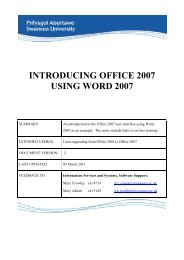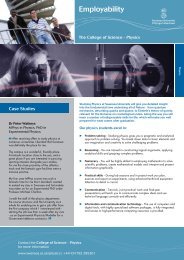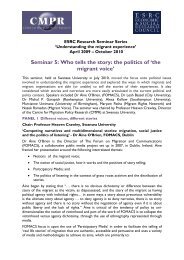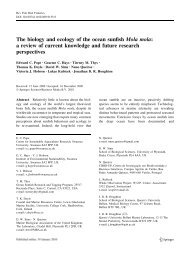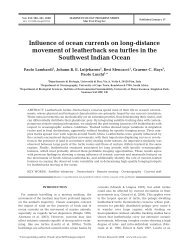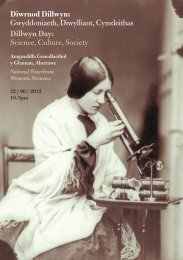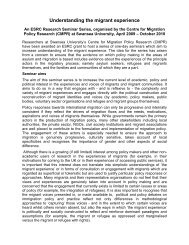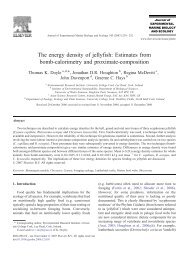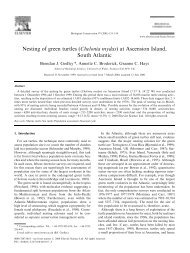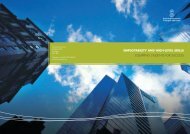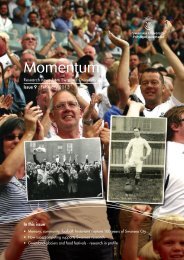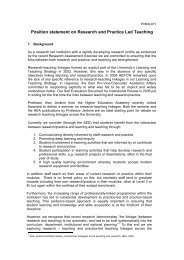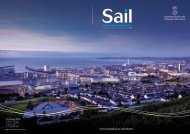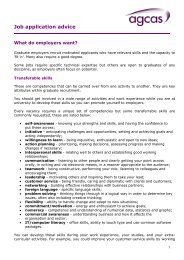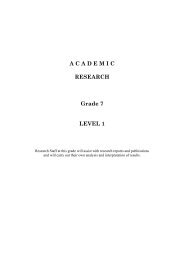Postgraduate Prospectus 2013 - Swansea University
Postgraduate Prospectus 2013 - Swansea University
Postgraduate Prospectus 2013 - Swansea University
You also want an ePaper? Increase the reach of your titles
YUMPU automatically turns print PDFs into web optimized ePapers that Google loves.
History<br />
Research opportunities<br />
MA by Research/MPhil/PhD<br />
RAE2008 50% of research rated<br />
world-leading (4*) or internationally<br />
excellent (3*)<br />
Professors<br />
H V Bowen<br />
D J Power<br />
J Spurr<br />
N W Thompson<br />
M Whitehead<br />
C Williams<br />
Academic and research staff 32<br />
<strong>Postgraduate</strong>s 141<br />
Entry requirements:<br />
Normally a good Honours degree<br />
(first-class or 2.1) in History or a<br />
related subject.<br />
English Language requirement:<br />
IELTS 6.5 (with a minimum of 5.5 in each<br />
component) or <strong>Swansea</strong> <strong>University</strong><br />
recognised equivalent.<br />
Scholarships and Bursaries<br />
A range of postgraduate scholarships and<br />
bursaries is available. For details, please<br />
visit: www.swansea.ac.uk/scholarships/<br />
<strong>Postgraduate</strong><br />
Other sources of funding include the Arts<br />
and Humanities Research Council, the<br />
Wellcome Trust and Local Education<br />
Authorities.<br />
How can I find out more?<br />
Visit our website:<br />
www.swansea.ac.uk/artsandhumanities<br />
Contact the Admissions Tutor:<br />
Email:<br />
COAHGradCentrePGRAdmissions@<br />
swansea.ac.uk<br />
Tel: +44 (0)1792 295926<br />
Visit the <strong>University</strong>:<br />
see page 174 for details<br />
Applications can be made online at<br />
www.swansea.ac.uk/applyonline<br />
– see pages 176 – 177 for further<br />
information<br />
For details of the Master’s courses<br />
available in History, please see page 66.<br />
Research Degrees – History<br />
History challenges us to understand the<br />
past so that we might make sense of the<br />
present. It encourages us to think about<br />
how the past is studied, written about,<br />
and represented, how it has been kept<br />
alive for generations, and how it can be<br />
preserved for generations to come.<br />
The Department welcomes proposals for<br />
postgraduate research projects that<br />
complement staff research interests.<br />
Research degrees in History will:<br />
• provide you with new and specialised<br />
research skills<br />
• prepare you for a career in academic<br />
research and teaching<br />
• equip you with skills relevant for a<br />
rewarding career in a range of diverse<br />
fields, including teaching, accountancy,<br />
banking, insurance, the media, marketing,<br />
and museum and heritage work<br />
The Richard Burton Archives hold<br />
collections of local, industrial and political<br />
records, as do the West Glamorgan<br />
Archive Service, the Royal Institution of<br />
South Wales, and the record offices at<br />
Cardiff and Carmarthen.<br />
The South Wales Miners’ Library, which is<br />
managed by the <strong>University</strong>, houses<br />
important printed and audio-visual aids for<br />
research into south Wales’ industrial and<br />
political history.<br />
The <strong>University</strong> is also a centre for<br />
American Studies and Medieval Studies,<br />
possessing staff expertise and library<br />
resources in these areas.<br />
Research Strengths<br />
Current research interests within the<br />
Department include:<br />
Medieval History<br />
• The Anglo-Norman ‘Realm’ and<br />
the Angevin Empire<br />
• Capetian France, especially<br />
the monarchy, aristocracy, and<br />
religious orders<br />
• The Cathars and the Albigensian<br />
Crusade<br />
• Charters and the documentary records<br />
of medieval France and England<br />
• The Mediterranean world, especially the<br />
Crusades, later medieval Italian society<br />
and politics, and the Italian<br />
Renaissance, including art history<br />
• England and Wales in the central and<br />
late Middle Ages, including the<br />
aristocracy and gentry, the Welsh<br />
Marches, urban history, law and crime,<br />
women and the law, religious belief and<br />
practice, and education and literacy<br />
• Gender and the life cycle in late<br />
medieval Europe<br />
• Medieval frontier societies and<br />
borderlands, and concepts of frontiers<br />
from the late Roman Empire to the<br />
present day<br />
Early Modern History<br />
• Most aspects of British history between<br />
1500 and 1800, especially religious,<br />
scientific, cultural and gender history<br />
• The history of health, medicine in early<br />
modern Britain<br />
• History of Disabilities<br />
• The Portuguese Empire<br />
• The Reformation and Counter-<br />
Reformation<br />
• Science, intellectual life, collecting and<br />
museums in early modern Europe<br />
• The social history of early modern<br />
sex and marriage<br />
• Crime and witchcraft<br />
• The Enlightenment, republicanism and<br />
international relations in the eighteenth<br />
century<br />
Modern History<br />
• Most aspects of Welsh history,<br />
especially industrial society<br />
• The cultural, intellectual and urban<br />
history of nineteenth century and<br />
twentieth century Britain<br />
• Modern International History<br />
• The United States since 1750,<br />
in particular slavery, the South<br />
and the Civil War<br />
• The economic and imperial history<br />
of Britain in the eighteenth and<br />
nineteenth centuries<br />
• Emigration and urbanisation in<br />
the British Isles between the<br />
eighteenth and twentieth centuries<br />
• The cultural history of Victorian<br />
Britain, including theatre and popular<br />
entertainment<br />
• The political history of the UK<br />
since 1800<br />
• Military and society in Europe<br />
between 1750 and 1815<br />
• Austrian and German history in the<br />
late eighteenth and nineteenth centuries<br />
• Austrian, German and Central<br />
European history, especially in the fields<br />
of urban, labour and post-1945 history<br />
• Modern Economic History<br />
• Quantitative aspects of British<br />
economic growth from the sixteenth<br />
to the twenty-first centuries<br />
• Demographic history<br />
• Anti-capitalist and socialist political<br />
economy<br />
• Policing and Police Forces in<br />
twentieth century Europe<br />
• Italian fascism<br />
• Allied Occupation of Italy<br />
• Contemporary French and Italian social<br />
and cultural history<br />
• Memory studies and oral history of<br />
twentieth century Europe<br />
• History of protest and activism in the<br />
1960s and 1970s<br />
Research Institute for Arts and Humanities<br />
The Research Institute for Arts and<br />
Humanities (RIAH) supports two major<br />
Research Centres, including the<br />
Callaghan Centre for the Study of<br />
Conflict, Power, Empire. The Callaghan<br />
Centre produces world-class research in<br />
the areas of conflict and security, empire<br />
and post-colonialism, ‘digital’ war, and<br />
conflict and culture. It also manages major<br />
Research Council funded projects, and<br />
promotes collaboration between scholars,<br />
policymakers and cultural providers. RIAH<br />
also supports a wide range of research<br />
groups, which provide a focus for<br />
specialist projects, postgraduate research,<br />
grant applications, seminar series, and<br />
contact with external partners. Research<br />
groups include:<br />
• The Richard Burton Centre for the<br />
Study of Wales<br />
• CECSAM, the Centre for the<br />
Comparative Study of the Americas<br />
• MEMO: Centre for Medieval and<br />
Early Modern Research<br />
For further information about<br />
RIAH, visit: www.swansea.ac.uk/<br />
artsandhumanities/riah<br />
All History research students belong to the<br />
Graduate Centre in the College of Arts<br />
and Humanities. The Centre provides<br />
pastoral as well as administrative support<br />
and is also responsible for research skills<br />
training and support, and facilitating a<br />
lively intellectual environment for the<br />
College’s postgraduate research<br />
community of 200 students.<br />
120<br />
121



